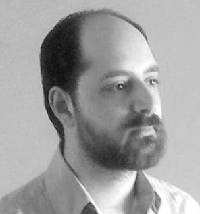Λοΐζος Μιχαήλ (Loizos Michael)

Ο Δρ. Λοΐζος Μιχαήλ είναι Καθηγητής στο Ανοικτό Πανεπιστήμιο Κύπρου, διευθυντής του Εργαστηρίου Υπολογιστικής Νόησης, και ακαδημαϊκός υπεύθυνος του Διιδρυματικού Μεταπτυχιακού Προγράμματος Σπουδών στα Γνωστικά Συστήματα (Cognitive Systems).
Ο Δρ Μιχαήλ είναι ιδρυτικό μέλος του Ερευνητικού Κέντρου Αριστείας CYENS, και υπεύθυνος του ερευνητικού πυλώνα Τεχνητής Νοημοσύνης και Επικοινωνιών. Η έρευνά του επικεντρώνεται στην ανάπτυξη υπολογιστικών μοντέλων για γνωστικές διεργασίες που σχετίζονται με την ατομική ή τη συλλογική ευφυΐα, ενσωματώνοντας τη θεωρία της υπολογιστικής νόησης, την αναπαράσταση γνώσης και τον συλλογισμό κοινής λογικής.
Έχει λάβει πτυχίο στην Επιστήμη των Υπολογιστών με δευτερεύον πτυχίο στα Μαθηματικά από το Πανεπιστήμιο Κύπρου, από όπου αποφοίτησε πρώτος ανάμεσα σε όλους τους φοιτητές του 2002, λαμβάνοντας το Βραβείο του Προέδρου της Κυπριακής Δημοκρατίας. Συνέχισε τις σπουδές του στο Πανεπιστήμιο Harvard, από όπου έλαβε μεταπτυχιακό και διδακτορικό τίτλο στην Επιστήμη της Πληροφορικής (Τεχνητή Νοημοσύνη) το 2008, υπό την επίβλεψη του Leslie Valiant. Πριν τον διορισμό του στο Ανοικτό Πανεπιστήμιο Κύπρου το 2009, κατείχε θέση επισκέπτη ακαδημαϊκού στο Πανεπιστήμιο Κύπρου. Ήταν κεντρικός ομιλητής στα συνέδρια ISD 2017 και AmI 2018, και έχει διατελέσει, ανάμεσα σε άλλα, ως ο πρόεδρος της επιστημονικής επιτροπής του 15th European Conference on Logics in Artificial Intelligence το 2016, και ως ο διοργανωτής της σειράς εργαστηρίων Cognitive Knowledge Acquisition από το 2015.
ΚΥΡΙΕΣ ΕΡΕΥΝΗΤΙΚΕΣ ΠΕΡΙΟΧΕΣ
- Τεχνητή Νοημοσύνη και Επεξηγήσιμη Τεχνητή Νοημοσύνη
- Γνωστικά Συστήματα / Προσωπικοί Βοηθοί
- Υπολογισμός Εμπνευσμένος από τη Φύση
- Αλληλεπίδραση Ανθρώπων με Μηχανική Βοήθεια
- Θεωρία Υπολογιστικής Μηχανικής Μάθησης
- Εξατομίκευση για Χρήστες μέσω Μάθησης
- Μηχανική Γνώσης και Συλλογισμός
- Κατανόηση Ιστοριών μέσω Γνώσης
- Εφαρμογές σε Έξυπνες Πόλεις και Κτήρια
English text follows
SHORT VITA
Dr Loizos Michael is Professor at Open University of Cyprus, where he founded and directs the Computational Cognition Lab. He is Academic Coordinator of the Joint M.Sc. Programme in Cognitive Systems. He is a founding member of the CYENS Research Centre of Excellence, within which he leads the research pillar on Artificial Intelligence and Communications.
His research focuses on the development of computational models for cognitive processes associated with individual or collective intelligence, integrating computational learning theory, knowledge representation, and commonsense
He received a B.Sc. in Computer Science with a minor degree in Mathematics from University of Cyprus, graduating top of the class of 2002, and receiving the Republic of Cyprus Presidential Award. He continued his education at Harvard University, where he received an M.Sc. and a Ph.D. in Computer Science (Artificial Intelligence) in 2008, under the supervision of Leslie Valiant. Before joining Open University of Cyprus in 2009, he was a visiting professor at University of Cyprus. He was a keynote speaker at ISD 2017 and AmI 2018, and he has served, among others, as the PC chair of the 15th European Conference on Logics in Artificial Intelligence in 2016, and as the organizer of a workshop series on Cognitive Knowledge Acquisition since 2015.
MAIN RESEARCH AREAS
• Artificial Intelligence and Explainable AI
• Cognitive Systems / Personal Assistants
• Nature and Biology-Inspired Computation
• Machine-Mediated Human Interaction
• Computational Machine Learning Theory
• Learning-Based User Personalization
• Knowledge Engineering and Reasoning
• Knowledge-Based Story Comprehension
• Smart City / Smart Building Applications
- Επικεφαλής του Εργαστηρίου Υπολογιστικής Νόησης του ΑΠΚΥ.
- Ακαδημαϊκός Υπεύθυνος του Διιδρυματικού Μεταπτυχιακού Προγράμματος “Cognitive Systems” του ΑΠΚΥ και του Πανεπιστημίου Κύπρου (2016-2018, 2019-).
- Ακαδημαϊκός Υπεύθυνος του Μεταπτυχιακού Προγράμματος «Πληροφοριακά και Επικοινωνιακά Συστήματα», ΑΠΚΥ (2015-2017).
- Υπεύθυνος του Επιστημονικού Πυλώνα σε θέματα Τεχνητής Νοημοσύνης και Επικοινωνιών στο Ερευνητικό Κέντρο Αριστείας CYENS.
English text follows
ADMINISTRATIVE/RESEARCH POSITIONS
- Director of the OUC Computational Cognition Lab.
- Academic Coordinator of the Joint Postgraduate Programme offered by OUC and the University of Cyprus “Cognitive Systems” (2016-2018, 2019- 2023).
- Academic Coordinator of the OUC Postgraduate Programme “Information and Communication Systems” (2015-2017).
- Research Pillar Leader of Artificial Intelligence and Communications at the CYENS Centre of Excellence.
- Michael, L. (2023), “Explainability and the Fourth AI Revolution”, in Carayannis, E. and Grigoroudis, E. (eds.), Handbook of Research on Artificial Intelligence, Innovation and Entrepreneurship, Edward Elgar Publishing.
- Michael, L. (2023), “Autodidactic and Coachable Neural Architectures”, in Hitzler, P., Sarker, MK, Eberhart, A. (eds.), Compendium of Neurosymbolic Artificial Intelligence, IOS Press.
- Malakarjun Patil, S., Michael, L. and Dovrolis, C. (2023), “Neural Sculpting: Uncovering Hierarchically Modular Task Structure Through Pruning and Network Analysis”, Annual Conference on Neural Information Processing Systems.
- Helm, P., Michael, L. and Schelenz, L. (2022), “Diversity by Design? Balancing the Inclusion and Protection of Users in an Online Social Platform”, 2022 AAAI/ACM Conference on AI, Ethics, and Society.
- Dietz, E., Kakas, A. and Michael, L. (2022), “Argumentation: A Calculus for Human-Centric AI”, Frontiers in Artificial Intelligence, 5, 955579.
- Tsamoura, E., Hospedales, T. and Michael, L. (2021), “Neural- Symbolic Integration: A Compositional Perspective”, 35th AAAI Conference on Artificial Intelligence.
- Michael, L. (2019), “Machine Coaching”, IJCAI Workshop on Explainable Artificial Intelligence.
- Kakas, A. and Michael, L. (2016), “Cognitive Systems: Argument and Cognition”, IEEE Intelligent Informatics Bulletin, 17(1), pp. 14-20.
- Michael, L. (2015), “The Disembodied Predictor Stance”, Pattern Recognition Letters, vol. 64 (C), pp. 21-29.
- Michael, L. (2014), “Simultaneous Learning and Prediction”, 14th International Conference on Principles of Knowledge Representation and Reasoning (KR2014).
- Michael, L. (2010), “Partial Observability and Learnability”, Artificial Intelligence, 174 (11), pp. 639-669.




